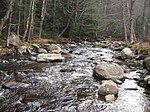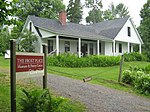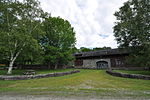Franconia, New Hampshire
1764 establishments in New HampshireFranconia, New HampshireTowns in Grafton County, New HampshireTowns in New HampshireUse mdy dates from July 2023

Franconia is a town in Grafton County, New Hampshire, United States. The population was 1,083 at the 2020 census. Set in the White Mountains, Franconia is home to the northern half of Franconia Notch State Park. Parts of the White Mountain National Forest are in the eastern and southern portions of the town. The Appalachian Trail crosses the town.
Excerpt from the Wikipedia article Franconia, New Hampshire (License: CC BY-SA 3.0, Authors, Images).Franconia, New Hampshire
Main Street,
Geographical coordinates (GPS) Address Nearby Places Show on map
Geographical coordinates (GPS)
| Latitude | Longitude |
|---|---|
| N 44.227222222222 ° | E -71.748333333333 ° |
Address
Presby Fuel
Main Street
03580
New Hampshire, United States
Open on Google Maps








